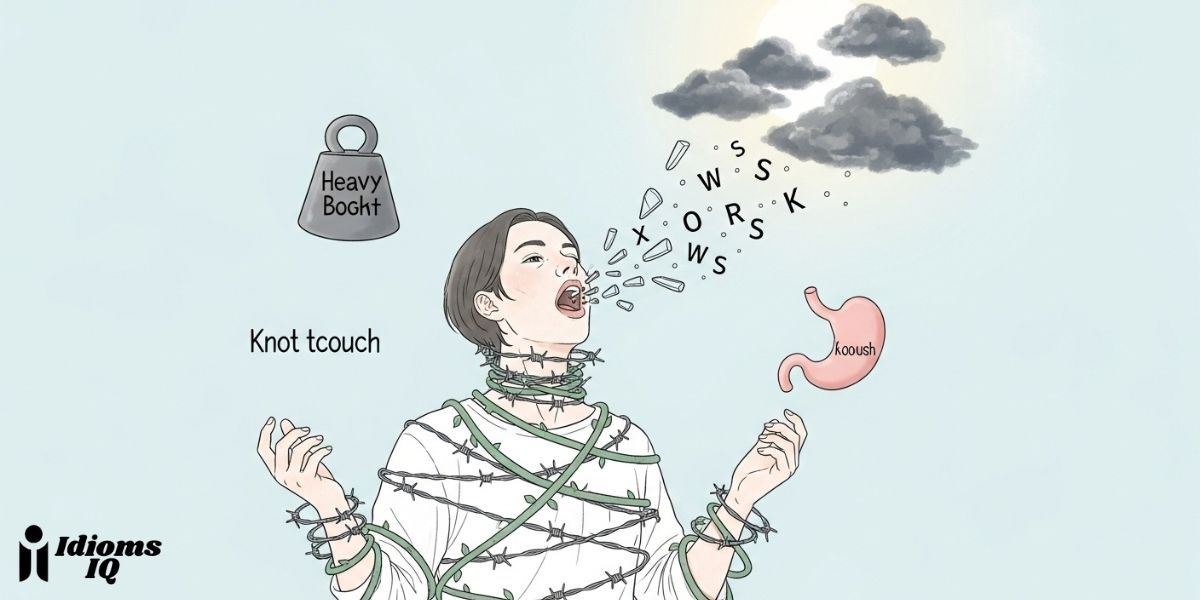
There’s a certain magic in the words of a mother. Whether it’s a piece of advice that only makes sense years later (“If at first you don’t succeed, try doing it the way mom told you to in the beginning“) or a simple expression of love that feels like a beacon in the dark, these words shape our world. But language itself has its own kind of magic, a way of painting vivid pictures that go far beyond literal meanings. This is the world of idioms.
An idiom is a phrase where the whole is greater and entirely different from the sum of its parts.
The Protector’s Embrace: Idioms of Fierce Love and Safety
The instinct to protect is a powerful force, often described as a form of “fierce compassion”. It’s a love that doesn’t just nurture but also defends. This primal, protective energy is beautifully captured in idioms that evoke both strength and safety.
Related: Idioms About Mother’s Love
The Fierce Protector (Mama Bear & Mother Hen)
These idioms personify the two sides of maternal protection: the fierce and the fussy.
- Mama Bear: This describes a mother who becomes aggressively protective when she perceives a threat to her children. Like a bear defending her cubs, this response is instinctual and formidable.
- Example: “When the coach unfairly benched her son, she went into full mama bear mode at the next parent meeting.”
- Mother Hen: This refers to a person who cares for others in a nurturing, sometimes fussy and overprotective, manner. They are constantly checking in, offering help, and ensuring everyone’s well-being.
- Example: “Our office manager is a real mother hen, always making sure we’ve eaten lunch and aren’t working too late.”
Creating a Safe Haven
Caregiving is also about building a sanctuary from the world’s sharp edges. These idioms describe the act of shielding, guiding, and ensuring safety.
- Wrapped (up) in Cotton Wool: To over-protect someone, shielding them from all potential risks and dangers, sometimes to an excessive degree.
- Example: “After his illness, his parents wrapped him in cotton wool for months.”
- In Safe Hands / In Good Hands: To be well cared for by someone who is competent and trustworthy.
- Example: “Don’t worry about the kids; they’re in safe hands with their grandmother.”
- Take (Someone) Under One’s Wing: To mentor, guide, and protect someone with less experience.
- Example: “When I started my new job, the senior manager took me under her wing.”
- Stick Your Neck Out (for someone): To take a personal risk in order to defend or help another person.
- Example: “She really stuck her neck out for me by telling the boss the mistake was her fault, not mine.”
- Play It Safe: To be cautious and deliberately avoid taking risks.
- Example: “Instead of investing in the new startup, she decided to play it safe and put her money in a savings account.”
- Better Safe Than Sorry: A proverb advising that it is wiser to take precautions, even if they seem unnecessary, than to face regret later.
- Example: “I’m going to back up my files on two hard drives. Better safe than sorry.”
The Nurturer’s Touch: Idioms of Support and Empathy
Beyond protection from physical harm, caregiving is defined by emotional support. It’s the act of listening, comforting, and simply being present. These idioms capture the essence of that nurturing touch.
Providing Comfort and Support
These expressions speak to the deep, empathetic connections that form the bedrock of any caring relationship.
- A Shoulder to Cry On: Someone who listens sympathetically and offers comfort during times of distress.
- Example: “After she lost her job, her best friend was a shoulder to cry on.”
- Lend a (Helping) Hand: To offer assistance or help with a task.
- Example: “Could you lend a hand with these groceries? They’re very heavy.”
- Be There for Somebody: To be reliably available to provide emotional or practical support whenever it is needed.
- Example: “No matter what happens, I’ll always be there for you.”
- Have Someone’s Best Interests at Heart: To genuinely care for someone’s well-being and want what is best for them, even if the actions or words are difficult.
- Example: “The advice was harsh, but I know my mother has my best interests at heart.”
- Joined at the Hip: Describes two people who are exceptionally close and spend a great deal of time together, as if physically connected.
- Example: “Those two sisters are joined at the hip; you never see one without the other.”
- See Eye to Eye: To agree with someone or share their perspective on a matter.
- Example: “My father and I don’t always see eye to eye on politics, but we respect each other.”
The Family Tapestry: Idioms of Kinship and Connection
Family is a complex tapestry woven with threads of loyalty, resemblance, and shared history. Idioms about kinship reflect the profound and often unspoken rules of these relationships.
The Unbreakable Bond
These idioms speak to the idea that family ties are fundamental and enduring.
- Blood Is Thicker Than Water: This proverb asserts that family relationships and loyalties are stronger and more important than any other type of relationship.
- Example: “He could have gone on vacation with his friends, but he chose to help his sister move. After all, blood is thicker than water.”
- Flesh and Blood: A term used to refer to a close relative, emphasizing a biological connection.
- Example: “I can’t believe my own flesh and blood would lie to me.”
- A Close-Knit Family: Describes a family whose members have very close, supportive, and loving relationships with one another.
- Example: “We’re a very close-knit family; we talk on the phone almost every day.”
A Legacy of Traits
Language is fascinated with the way traits, behaviors, and appearances are passed down through generations.
- Like Mother, Like Daughter / Like Father, Like Son: A proverb indicating that a child’s character, habits, or appearance strongly resembles that of their parent.
- Example: “My daughter is so organized and tidy like mother, like daughter!”
- A Chip Off the Old Block: A child who is strikingly similar to one of their parents (traditionally the father) in character, mannerisms, or looks.
- Example: “He loves woodworking, just like his dad. He’s a real chip off the old block.”
- The Apple Doesn’t Fall Far from the Tree: This saying suggests that children inherit traits and behaviors from their parents and thus share many similarities with them.
- Example: “She’s a fantastic singer, just like her mother was. The apple doesn’t fall far from the tree.”
- Spitting Image: An exact likeness or duplicate of another person in appearance.
- Example: “That little boy is the spitting image of his grandfather.”
- Run in the Family: A quality, ability, or disease that is a common characteristic among members of the same family.
- Example: “A talent for music seems to run in the family.”
A Legacy of Wisdom & The Weight of Expectation
The role of a mother or caregiver is one of life’s most complex. It involves not only love and support but also teaching, disciplining, and navigating high expectations. The existence of a wide range of idioms, some praising, others critical reveals a deep cultural acknowledgment of this complexity. Language provides tools not just to celebrate the ideal, but also to understand the challenges and potential pitfalls of this fundamental human relationship.
Lessons Learned and Wisdom Gained
These idioms position the mother as a foundational source of knowledge and provision.
- At One’s Mother’s Knee: To have learned something at a very young age, as if taught directly by one’s mother during childhood.
- Example: “I learned the importance of kindness at my mother’s knee.”
- Mother Knows Best: A common phrase asserting that a mother’s intuition, advice, or judgment is correct and should be trusted.
- Example: “I should have worn a jacket like she said. Mother knows best.”
- Bring Home the Bacon: To earn a salary or provide the financial support for a family.
- Example: “Since her partner lost his job, she’s been working two jobs to bring home the bacon.”
The Complexities of Care
These expressions highlight the fine line between care and control, support and suffocation, reflecting the nuanced challenges of parenting.
- Tied to Mother’s Apron Strings: Describes an adult, typically a man, who is overly dependent on his mother and unable to act independently.
- Example: “He’s 40 years old but still tied to his mother’s apron strings; he can’t make a decision without her.”
- Mama’s Boy: A man who is perceived as being excessively attached to or influenced by his mother.
- Example: “His girlfriend complained that he was too much of a mama’s boy, always taking his mom’s side.”
- Tiger Mom: A strict, demanding mother who pushes her children relentlessly to achieve high levels of academic and extracurricular success.
- Example: “With violin lessons, advanced calculus, and three languages, his tiger mom left him with no free time.”
- Smother Mother: An overprotective mother whose excessive care and attention feel suffocating to her child.
- Example: “Calling me five times a day at college is classic smother mother behavior.”
- Helicopter Parenting: A style of parenting characterized by hovering over one’s children and being overly involved in their lives, often to the detriment of their independence.
- Example: “The teacher wished the parents would stop the helicopter parenting and let the kids solve their own minor disputes.”
- Spare the Rod and Spoil the Child: A proverb suggesting that if children are not physically punished for misbehavior, their personal development will suffer.
- Example: “My grandfather believed firmly in ‘spare the rod and spoil the child,’ so he was very strict.”
The “Mother” of All Expressions: Idioms of Origin and Extremes
The word “mother” is so powerful that it has become a metaphor for origin, creation, and extremity in the English language. These idioms show how the concept of motherhood is embedded in the very DNA of how we describe the world.
Mother as the Source
These proverbs use “mother” to signify the source or ultimate cause of a phenomenon.
- Necessity is the Mother of Invention: When the need for something becomes essential, people are forced to find creative ways of achieving or creating it.
- Example: “The stranded sailor created a fishing hook from a piece of wire truly, necessity is the mother of invention.”
- Experience is the Mother of Wisdom: True wisdom is gained not from theory but from direct personal experience.
- Example: “You can read about business all you want, but you’ll only learn how to run one when you do it. Experience is the mother of wisdom.”
- Failure is the Mother of Success: Setbacks and mistakes are often essential learning experiences on the path to achieving one’s goals.
- Example: “My first three business ideas failed, but I learned so much. Failure is the mother of success.”
- Mother Nature: The personification of the natural world and its forces, such as weather and biology.
- Example: “After the hurricane, it was clear that Mother Nature was not to be underestimated.”
- Mother Tongue: The first language that a person learns from birth.
- Example: “Although he is fluent in English, his mother tongue is Spanish.”
Extreme Examples and Secret Keepers
This final group showcases the versatility of “mother” and its variant “mum” in expressing extremes and confidentiality.
- The Mother of All…: The largest, most intense, or most impressive example of a particular thing.
- Example: “I have the mother of all headaches today.”
- A Face Only a Mother Could Love: A humorous, though often unkind, idiom used to describe someone who is very unattractive. The phrase relies on the idea that a mother’s love is so unconditional it transcends physical appearance.
- Example: “The puppy was so scruffy and strange-looking, it had a face only a mother could love, but we adopted it anyway.”
- Mum’s the Word: A declaration or promise to keep something a secret. The “mum” here derives from a Middle English word for “silent” and was famously used by Shakespeare.
- Example: “Don’t tell anyone about the surprise party. Remember, mum’s the word!”
- Keep Mum: To remain silent about something and not reveal a secret.
- Example: “He refused to keep mum about the company’s illegal activities and went to the press.”
Table: A Quick-Reference Guide to 40 Idioms for Mother and Care
For easy review, here is a summary of all the idioms we’ve explored. This table serves as a handy glossary to help you remember and use these colorful expressions.
| Idiom | Brief Meaning |
| 1. Mama Bear | A fiercely protective mother. |
| 2. Mother Hen | A person who fusses over and protects others. |
| 3. Wrapped in Cotton Wool | To be over-protected. |
| 4. In Safe Hands | Being well cared for by someone trustworthy. |
| 5. Take Under One’s Wing | To mentor and protect someone less experienced. |
| 6. Stick Your Neck Out | To take a risk to help someone. |
| 7. Play It Safe | To be cautious and avoid risks. |
| 8. Better Safe Than Sorry | It’s wiser to take precautions. |
| 9. A Shoulder to Cry On | Someone who offers emotional support. |
| 10. Lend a Helping Hand | To offer assistance. |
| 11. Be There for Somebody | To be available to provide support. |
| 12. Have Someone’s Best Interests at Heart | To genuinely want what is best for someone. |
| 13. Joined at the Hip | To be exceptionally close to someone. |
| 14. See Eye to Eye | To agree with someone. |
| 15. Blood Is Thicker Than Water | Family bonds are the strongest. |
| 16. Flesh and Blood | A close relative. |
| 17. A Close-Knit Family | A family that is very close and supportive. |
| 18. Like Mother, Like Daughter | A daughter resembles her mother. |
| 19. A Chip Off the Old Block | A child who is very similar to a parent. |
| 20. The Apple Doesn’t Fall Far from the Tree | A child shares traits with their parents. |
| 21. Spitting Image | An exact resemblance. |
| 22. Run in the Family | A trait common to a family. |
| 23. At One’s Mother’s Knee | I learned as a very young child. |
| 24. Mother Knows Best | A mother’s advice is correct. |
| 25. Bring Home the Bacon | To earn a living for the family. |
| 26. Tied to Mother’s Apron Strings | An adult who is overly dependent on their mother. |
| 27. Mama’s Boy | A man overly influenced by his mother. |
| 28. Tiger Mom | A strict, demanding mother focused on achievement. |
| 29. Smother Mother | An overprotective, suffocating mother. |
| 30. Helicopter Parenting | A style of over-involved parenting. |
| 31. Spare the Rod and Spoil the Child | Discipline is necessary for a child’s development. |
| 32. Necessity is the Mother of Invention | Great need inspires new solutions. |
| 33. Experience is the Mother of Wisdom | We learn best from experience. |
| 34. Failure is the Mother of Success | Failure is a necessary step toward success. |
| 35. Mother Nature | The personification of nature. |
| 36. Mother Tongue | One’s native language. |
| 37. The Mother of All… | The biggest or most extreme example of something. |
| 38. A Face Only a Mother Could Love | A humorous way of saying someone is unattractive. |
| 39. Mum’s the Word | A promise to keep a secret. |
| 40. Keep Mum | To stay silent about a secret. |
Weave These Expressions into Your Life’s Story
From the fierce protection of a mama bear to the foundational wisdom learned at a mother’s knee, idioms are more than just quirky phrases. They are a form of artistic expression, tiny verbal canvases that add richness, emotion, and cultural depth to our language. By understanding them, we gain a more nuanced appreciation for the way we communicate our most complex relationships.
The next time you hear one of these expressions in a movie, a book, or a conversation, you’ll recognize it not just as a figure of speech, but as a piece of shared human experience, passed down through generations.
We’ve shared 40 of our favorite idioms for mother and care, but we know there are hundreds more. What’s an idiom about family or support that you love? Share it in the comments below and tell us what it means to you!






